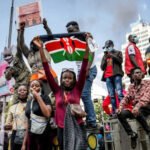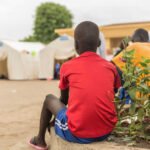The alarming revelation that agents are trafficking teenage Nigerian girls for prostitution in Ivory Coast highlights a grave human rights violation.
Development Diaries reports that many teenage Nigerian girls are being trafficked to Ivory Coast under the guise of better-paid jobs, while some are currently trapped in the country’s sex industry.
According to a report by The Guardian, 13-year-old Nigerian girls were trafficked to Ivory Coast and used as sex prostitutes.
Also, the United Nations estimates that about 750,000 to one million persons are trafficked annually in Nigeria.
This situation reflects not only the perilous conditions these young girls face but also the failure of the authorities to protect some of the most vulnerable members of society.
In fact, the President of the Nigeria Community in the Ivory Coast, Onwuchelu Emeka, recently lamented that the similar situation in the West African country is pathetic and needs urgent intervention by the Nigerian government.
These situations are a stark reminder of the urgent need for more robust measures to combat human trafficking. The National Agency for the Prohibition of Trafficking in Persons (NAPTIP)’s silence on this matter is deeply concerning.
As the agency responsible for addressing human trafficking in Nigeria, NAPTIP’s role is critical in safeguarding citizens, especially those who are vulnerable to such heinous crimes.
By not commenting or acting swiftly, NAPTIP risks sending a dangerous message that the plight of these victims is not a priority. Also, the lack of response could embolden traffickers and create an environment where such activities continue unchecked.
To address this, NAPTIP must urgently launch a comprehensive investigation into the trafficking networks that are operating between Nigeria and Ivory Coast.
In achieving this, collaboration with international law enforcement and human rights organisations would be ideal to ensure that traffickers are identified and brought to justice.
Secondly, NAPTIP should increase public awareness campaigns, focusing on the dangers of trafficking and how young girls can protect themselves from becoming victims.
Furthermore, the agency needs to enact stronger support systems for victims of trafficking to ensure that the girls who have been trafficked are provided with adequate rehabilitation and reintegration services.
Development Diaries calls on NAPTIP to demonstrate its commitment to protecting Nigerian citizens and reaffirm its role as a critical force in the fight against human trafficking.
Silence is not an option, as decisive and immediate action is required to save these young girls from further harm.
Photo source: Imagens Evangélicas






